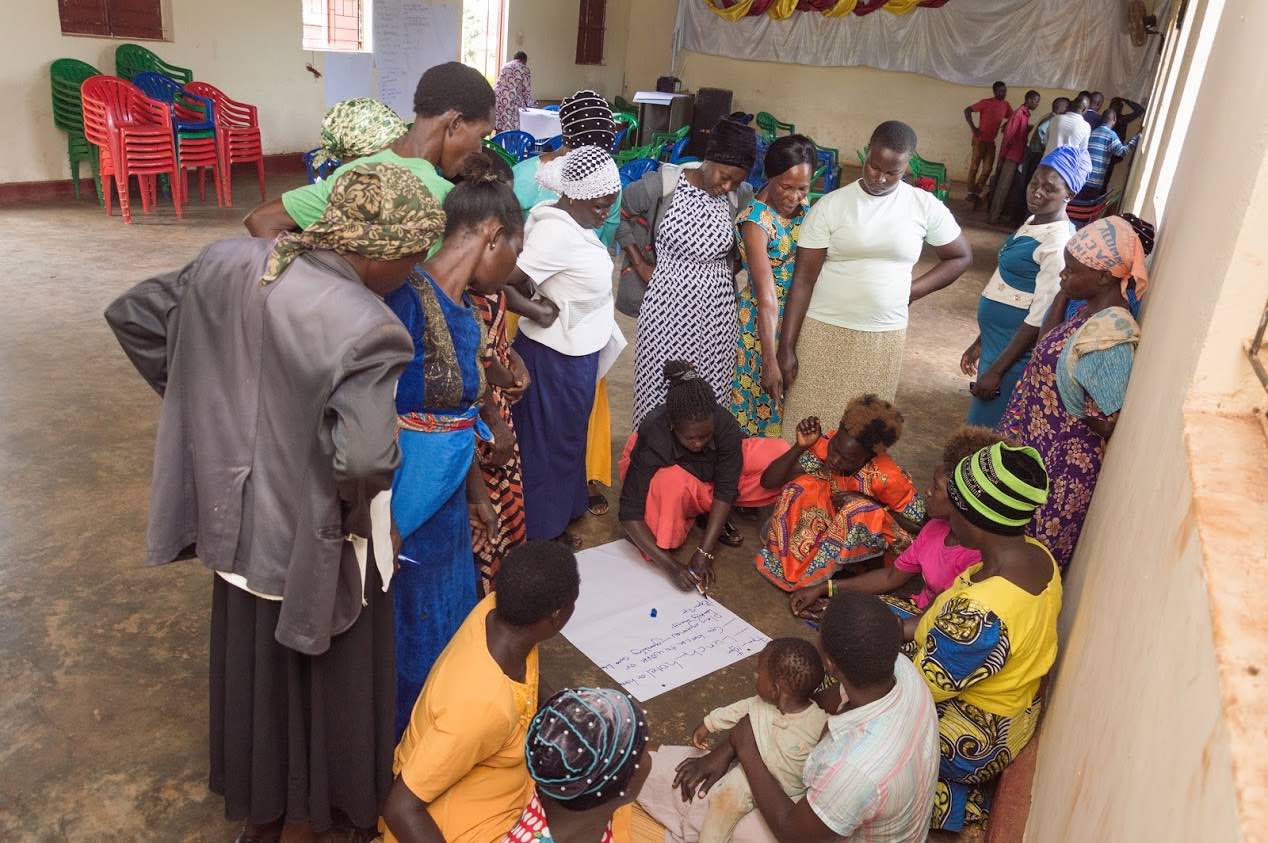Come, Let us Work Together: A section of the beneficiaries during one of the gender inclusivity training and sensitization sessions held in October, 2019 in Busia, Uganda.
Fifty-six year-old George Kwenboi and his wife Margaret live in Tiira village, Sikuda Sub County in Busia District, Uganda. Mr Kwenboi, a gold mine worker, and his wife have nine children—three boys and six girls. Although Mr Kwenboi recalls attaining basic knowledge on gender equality as early as 10 years ago, he admits that beliefs he acquired while growing up on the roles and responsibilities of men and women were biased against women.
In Uganda, women face a myriad of gender inequality and inclusivity challenges attributed to the social norms and beliefs. For example, some communities perceive the woman as the primary caregiver while the man takes on the roles of provision including running businesses, protecting families and community, providing shelter and grazing among others. Compared to the boy-child, education for the girl-child is deemphasized and under prioritized, further contributing to early marriages.
At the same time, among mining communities in Uganda, it is commonplace for men to remarry and abandon their families leaving the burden of fending for families to women. This, compounded by lower incomes for women, further exacerbates the financial strain for the affected families. Furthermore, some mining zones discriminate against women when hiring due to long standing beliefs and gender biases against women miners within the community.
The long journey to changing attitudes and behaviors
George Kwenboi had always considered himself to be the sole decision-maker, as head of his family. According to him, the specific roles of men and women were culturally determined and assigned. On the other hand, his wife Margaret had never attended a gender equality and inclusivity training. Instead, she found a role model in one of their neighbors who is a businesswoman and tailor. Thus inspired, George and Margaret agreed to participate in Solidaridad’s Gender Inclusivity Training.
This training is one component of Solidaridad's efforts to address gender imbalances and ensure no girl or woman is left behind, and to champion and drive community-led gender inclusivity initiatives. The initiatives, including the training and sensitization, are delivered using the Gender Action Learning System (GALS) methodology, a community-led household methodology aimed at empowering both women and men on personal, household, community and organizational development.
Turning new attitudes into new opportunities
Through the gender inclusivity training and sensitization initiatives, Solidaridad reached 54 beneficiaries, 25 male (14 adults and 11 youth) and 29 female (19 adults and 10 youth) in October 2019. These interventions have contributed to increased awareness on gender equality and inclusivity issues at household and the community level including the complementary roles of men and women. Key results of the intervention included:
-
More community members in Busia, Uganda recognize the importance of gender balance, respect for women, education for girls, conflict resolution and sharing of family roles and responsibilities such as paying school fees.
-
Community members were equipped with essential skills to run sustainable businesses including decision making, resource pooling and partnerships among other business skills.
-
Facilitation of a Village Savings and Loan Association (VSLA) training to enhance the beneficiaries’ awareness of the model as an approach for pooling resources for internal lending and income generation.
The work continues towards a more equitable future
My husband has had a change of heart since the gender training from Solidaridad. He now respects me and what I do. He now understands gender balance in our family.” – Margaret Kwenboi
Despite the positive step in her life, Margaret feels that there is still a lot to be done. “Women are still faced with many challenges. For instance, it is common for husbands to abscond their family responsibilities and leave them to their wives thus causing a lot of suffering. This has led to increased cases of child sexual exploitation when young girls have to seek employment in hotels and bars to support their mothers fend for the younger siblings,” she adds. Furthermore, women who lack income or capital to start businesses become vulnerable and easily manipulated by men.
Now that Mr Kwenboi’s perspective on gender equality and inclusivity has changed, he champions for more interventions to be carried out within Busia District to empower more women on issues such as access to soft loans or grants to start small businesses as well as training women on basic skills such as operating mining machines to equip them with the requisite skills to participate and benefit fairly from the mining value chain.

